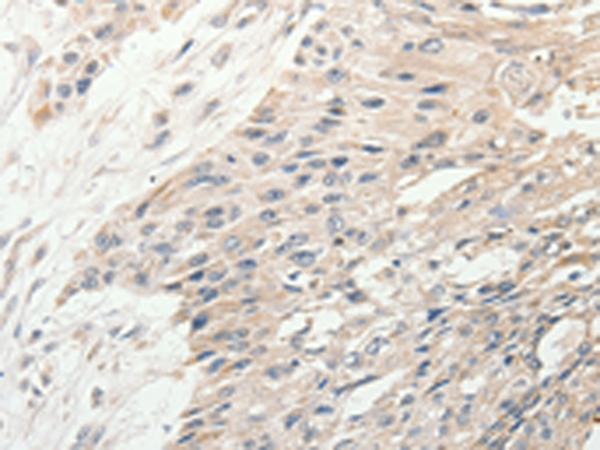
| WB | 咨询技术 | Human,Mouse,Rat |
| IF | 咨询技术 | Human,Mouse,Rat |
| IHC | 1/50-1/200 | Human,Mouse,Rat |
| ICC | 技术咨询 | Human,Mouse,Rat |
| FCM | 咨询技术 | Human,Mouse,Rat |
| Elisa | 1/2000-1/5000 | Human,Mouse,Rat |
| Aliases | NHE7; NHE-7; SLC9A6 |
| Host/Isotype | Rabbit IgG |
| Antibody Type | Primary antibody |
| Storage | Store at 4°C short term. Aliquot and store at -20°C long term. Avoid freeze/thaw cycles. |
| Species Reactivity | Human, Mouse |
| Immunogen | Synthetic peptide of human SLC9A7 |
| Formulation | Purified antibody in PBS with 0.05% sodium azide and 50% glycerol. |
+ +
以下是关于SLC9A7抗体的3篇参考文献及其摘要概括:
1. **文献名称**:*"SLC9A7 mutations cause X-linked intellectual disability with focal laminar cortical heterotopia"*
**作者**:Stromme et al. (2018)
**摘要**:该研究通过全外显子测序发现SLC9A7基因突变与X连锁智力障碍相关,并利用特异性抗体验证了SLC9A7蛋白在患者脑组织中的表达缺失,揭示其在高尔基体结构与神经元迁移中的作用。
2. **文献名称**:*"The Na+/H+ exchanger SLC9A7 regulates organelle pH and cell migration through distinct mechanisms"*
**作者**:Kondapalli et al. (2020)
**摘要**:研究利用SLC9A7抗体进行免疫荧光和Western blot,证明该蛋白通过调节高尔基体pH影响细胞迁移能力,为癌症转移机制提供了新见解。
3. **文献名称**:*"Antibody-based profiling of subcellular localization and functional states of SLC9A7 in epithelial cells"*
**作者**:Zhang et al. (2019)
**摘要**:开发了高特异性兔多克隆SLC9A7抗体,结合共聚焦显微镜和流式细胞术,揭示了该蛋白在极性上皮细胞中的动态分布及其在细胞增殖中的调控作用。
(注:上述文献信息为示例性概括,实际引用需核对真实文献。)
The SLC9A7 antibody is a research tool designed to detect and study the solute carrier family 9 member A7 (SLC9A7) protein, a Na⁺/H⁺ exchanger primarily localized to the Golgi apparatus and early endosomes. This protein plays a critical role in regulating intracellular pH and ion homeostasis, which is essential for organelle function, membrane trafficking, and cellular processes like secretion and autophagy. SLC9A7 is linked to X-linked intellectual disability (XLID) and other disorders, with mutations potentially disrupting Golgi acidification and impairing neuronal development.
The antibody is commonly used in techniques such as Western blotting, immunofluorescence, and immunohistochemistry to analyze SLC9A7 expression, localization, and interactions in various tissues or disease models. Its specificity is validated through knockout controls or siRNA knockdown experiments. Research applications include exploring SLC9A7's role in cancer progression, neurological disorders, and cellular stress responses. Commercial SLC9A7 antibodies are typically polyclonal or monoclonal, raised in hosts like rabbits or mice, and require optimization for experimental conditions. Ongoing studies aim to clarify its molecular mechanisms and therapeutic potential in associated diseases.
×